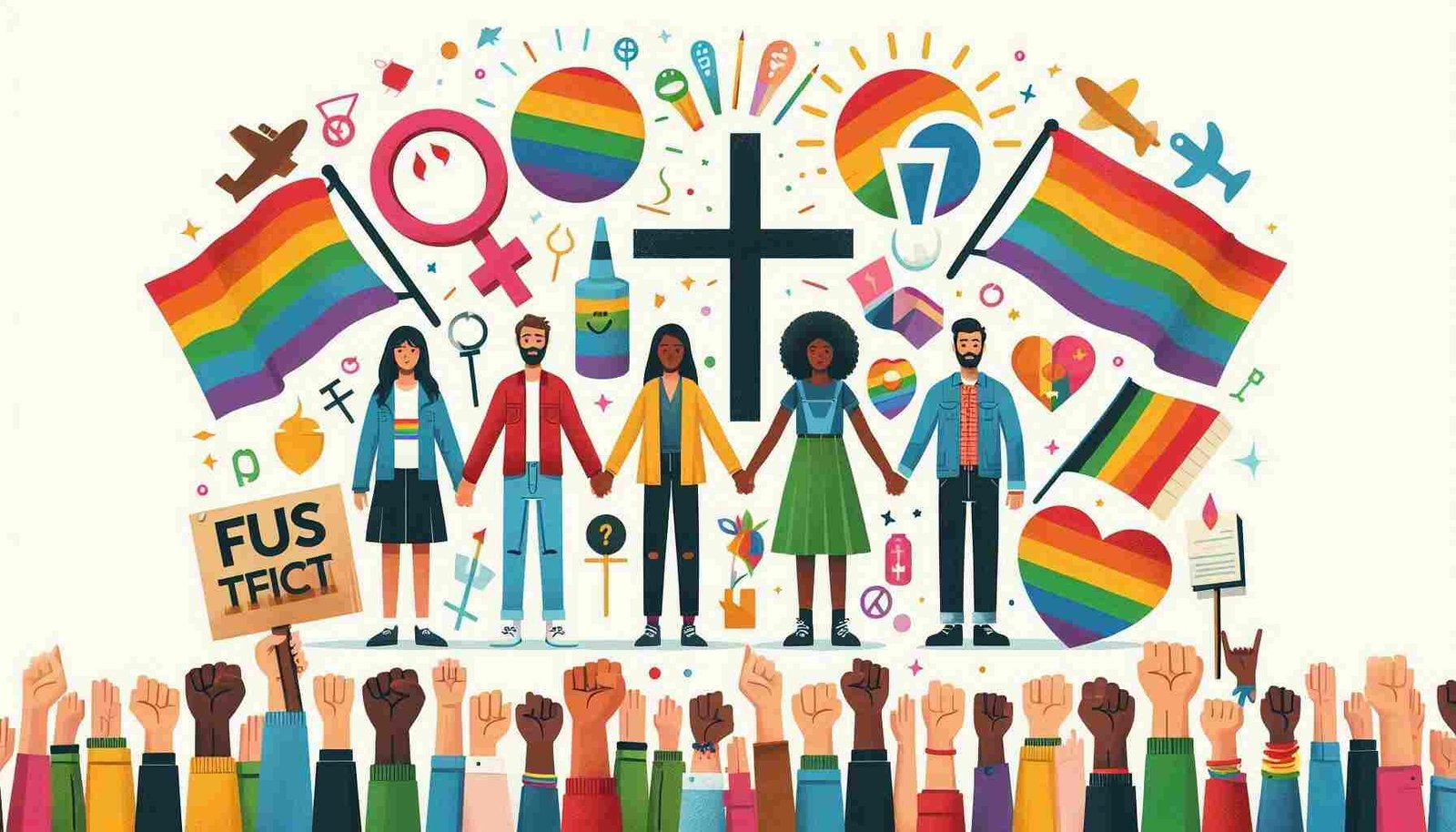The rise of the term “social justice” among Christians has coincided with a growing level of misunderstanding, misuse, and misapplication of the term. The term “social justice” was coined in the 1840s by Jesuit priest Luigi Taparelli D’Azeglio, who based the concept on the teachings of Thomas Aquinas. Over time, the term became widely associated with liberal secular political philosophy, particularly with changing social institutions. However, from a Christian perspective, justice can be defined as “when all God’s creatures receive what is due them and contribute out of their uniqueness to our common existence.” Christians are engaged in social justice whenever they advocate for issues such as abortion, racial reconciliation, religious liberty, and sex trafficking, seeking to ensure that every person is treated with dignity.
Key Takeaways
- The term “social justice” has a complex history, with roots in Christian theology and connections to secular political philosophies.
- Christians can engage in social justice by advocating for issues that uphold the dignity and rights of all people, such as abortion, racial reconciliation, religious liberty, and sex trafficking.
- A Christian perspective on social justice is grounded in the belief that all of God’s creatures should receive what is due to them and contribute to the common good.
- Misunderstandings and misapplications of the term “social justice” have led to confusion among some Christians, but the core principles align with biblical teachings on justice and human dignity.
- Christians can play a vital role in shaping a uniquely Christian vision of social justice that is rooted in faith and centered on the equality and value of all people.
Understanding Social Justice
The concept of social justice has evolved over time, with its origins dating back to the 1840s, when Jesuit priest Luigi Taparelli D’Azeglio first coined the term. Taparelli’s idea of social justice was rooted in the teachings of Thomas Aquinas, and it was originally associated with conservative political philosophy, referring to the traditional conception of justice applied to the constitutional arrangements of society.
Over time, the term “social justice” has become widely associated with liberal secular political philosophy, particularly with the goal of changing social institutions to ensure a more equitable distribution of wealth, opportunities, and privileges within a society. The Oxford English Dictionary defines social justice as “justice in terms of the distribution of wealth, opportunities, and privileges within a society,” while a more comprehensive definition comes from the Institutes of Justinian, which defines justice as “the set and constant purpose which gives to every man his due.”
Origins and Definitions of Social Justice
The origins of social justice can be traced back to the 1840s, when Jesuit priest Luigi Taparelli D’Azeglio first introduced the term based on the teachings of Thomas Aquinas. Taparelli’s concept was considered a significant contribution to conservative political philosophy at the time, as he used the term to refer to the ordinary and traditional conception of justice applied to the constitutional arrangements of society.
Over time, the term “social justice” has become more closely associated with liberal secular political philosophy, particularly with the goal of changing social institutions to ensure a more equitable distribution of wealth, opportunities, and privileges within a society. The Oxford English Dictionary defines social justice as “justice in terms of the distribution of wealth, opportunities, and privileges within a society.”
Biblical Foundations of Justice
From a Christian perspective, the biblical conception of justice is primarily captured in two Hebrew words: mishpat and tzadeqah. Mishpat refers to treating people equitably, acquitting or punishing every person on the merits of the case, regardless of race or social status. Tzadeqah refers to a life of right relationships, where a person conducts all relationships in family and society with fairness, generosity, and equity. Together, these two words roughly correspond to what some have called “primary” and “rectifying justice.” Rectifying justice (mishpat) means punishing wrongdoers and caring for the victims of unjust treatment, while primary justice (tzadeqah) is behavior that, if it were prevalent in the world, would render rectifying justice unnecessary.
“Justice is when all God’s creatures receive what is due them and contribute out of their uniqueness to our common existence.”
The Relationship Between Social Justice and the Gospel
In the early 20th century, various liberal Christian groups began to conflate the social justice movement with the gospel, resulting in the “social gospel” movement. However, a true understanding of the gospel allows Christians to work for justice in the world without undermining the centrality of the gospel. As renowned theologian Don Carson explains, the gospel is the good news of what God has done, especially in Christ Jesus, and it not only reconciles us to God but also transforms us, shaping our behavior, priorities, values, and relationships with people.
To preach moral duty without the underlying power of the gospel is moralism that is both pathetic and powerless, while to preach the gospel and Christian social justice as equivalent demands is to misunderstand how the Bible hangs together. The gospel is the foundation for our social justice work, not the other way around. When we truly grasp the implications of the gospel, we are compelled to pursue justice and righteousness in the world, not as a means of earning God’s favor but as a natural outworking of our new identity in Christ.
“The gospel is the good news of what God has done, especially in Christ Jesus, and it not only reconciles us to God but also transforms us, shaping our behavior, priorities, values, and relationships with people.”
By rightly understanding the relationship between the gospel and social change, Christians can engage with social justice issues in a way that is faithful to Scripture and true to the transformative power of the gospel. This approach avoids the pitfalls of both moralistic activism and a detached, individualistic faith, instead offering a vision of Christian social justice that is grounded in the redemptive work of Christ.
How do Christians engage with social justice issues?
Christians have long been at the forefront of advocating for social justice and driving meaningful change in society. Whether they use the term or not, their engagement with social justice issues is rooted in a deep commitment to upholding the inherent dignity of every human being. This conviction compels them to speak out against injustice and work towards the moral reform of their communities.
Christian Advocacy and Social Reform
Throughout history, Christian leaders have played a pivotal role in Christian advocacy and social reform. Figures like John Wesley, the 18th-century evangelical leader, championed prison reform and the abolition of slavery in England. More recently, Ron Sider and Jim Wallis, prominent evangelical voices, have advocated for Christian engagement in anti-war, environmental, and immigration causes.
Today, Christians continue to be at the forefront of addressing a wide range of social justice issues, such as abortion, racial reconciliation, religious liberty, and sex trafficking. They work tirelessly to promote justice and transform unjust systems and structures, ensuring that every person is treated with the dignity they deserve.
“The true measure of any society can be found in how it treats its most vulnerable members.” – Mahatma Gandhi
This Christian commitment to social justice is not merely a political or social agenda but a reflection of the Gospel’s call to love our neighbors and seek the welfare of our communities. By engaging in Christian advocacy and social reform, believers strive to be a force for positive change, reflecting the love and justice of God in a hurting world.

| Christian Leader | Social Justice Causes |
|---|---|
| John Wesley | Prison reform, Abolition of slavery |
| Ron Sider | Anti-war, Environmental, Immigration |
| Jim Wallis | Anti-war, Environmental, Immigration |
A Uniquely Christian Vision of Social Justice
The Christian vision of social justice begins with respect for the equal dignity of each person, based on the idea that we are all made in the image of God. It abhors any attempt to dehumanize anybody on any front, recognizing a fundamental human solidarity in being part of the same creation.
Respect for Human Dignity
This vision of social justice recognizes the inherent worth and value of every individual, regardless of their circumstances or background. It calls us to see the image of God in each person and to treat them with the respect and care they deserve.
The Importance of Memory and Narrative
The Christian vision of social justice also emphasizes the importance of memory and narrative in understanding and addressing issues of injustice. The Bible is filled with stories of marginalization and transformation, which we continue to live out. Today, many Americans are trying to tell the true history of our people, a tale that doesn’t whitewash the shameful themes in our narrative nor downplay the painful but uneven progress. This emphasis on memory and narrative is a crucial component of the uniquely Christian approach to social justice, as it allows us to understand the deeper roots of injustice and work towards lasting, meaningful change.
FAQ
What is the origin and definition of the term “social justice”?
The term “social justice” was coined in the 1840s by Jesuit priest Luigi Taparelli D’Azeglio, who based the concept on the teachings of Thomas Aquinas. Over time, the term became widely associated with liberal secular political philosophy, particularly with changing social institutions. However, from a Christian perspective, justice can be defined as “when all God’s creatures receive what is due them and contribute out of their uniqueness to our common existence.”
What are the biblical foundations of justice?
The biblical conception of justice is primarily captured in two Hebrew words: mishpat and tzadeqah. Mishpat refers to treating people equitably, acquitting or punishing every person on the merits of the case, regardless of race or social status. Tzadeqah refers to a life of right relationships, where a person conducts all relationships in family and society with fairness, generosity, and equity. Together, these two words roughly correspond to what some have called “primary” and “rectifying justice.” Rectifying justice (mishpat) means punishing wrongdoers and caring for the victims of unjust treatment, while primary justice (tzadeqah) is behavior that, if it were prevalent in the world, would render rectifying justice unnecessary.
How do the gospel and social justice relate?
In the early 20th century, various liberal Christian groups began to conflate the gospel with social justice, resulting in the “social gospel” movement. However, a true understanding of the gospel allows Christians to work for justice in the world without undermining the centrality of the gospel. The gospel is the good news of what God has done, especially in Christ Jesus, and it not only reconciles us to God but also transforms us, shaping our behavior, priorities, values, and relationships with people.
How do Christians engage with social justice issues?
Whether they use the term or not, Christians are engaged in social justice when they advocate for issues such as abortion, racial reconciliation, religious liberty, and sex trafficking. They engage in social justice whenever they seek moral reform of their society in a way that ensures every person is treated with dignity. This can take the form of Christian advocacy and social reform, where Christians work to promote justice and change unjust systems and structures.
What is the unique Christian vision of social justice?
The Christian vision of social justice begins with respect for the equal dignity of each person, based on the idea that we are all made in the image of God. It abhors any attempt to dehumanize anybody on any front, recognizing a fundamental human solidarity in being part of the same creation. This vision also emphasizes the importance of memory, as the Bible is filled with stories of marginalization and transformation that we continue to live out. Many Americans today are trying to tell the true history of our people, a tale that doesn’t whitewash the shameful themes in our narrative nor downplay the painful but uneven progress, but rather is realist without being despairing.








